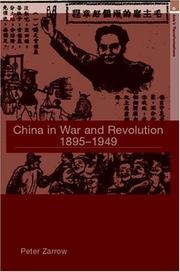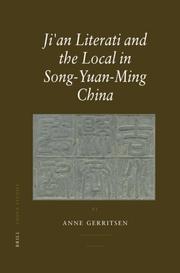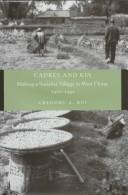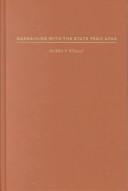| Listing 1 - 10 of 227 | << page >> |
Sort by
|
Book
ISBN: 1423216814 9781423216810 9781423216384 Year: 2011 Publisher: Boca Raton : BarCharts, Inc.,
Abstract | Keywords | Export | Availability | Bookmark
 Loading...
Loading...Choose an application
- Reference Manager
- EndNote
- RefWorks (Direct export to RefWorks)
China is known for its rich culture and a history marked by wars, dynasties, alliances, and innovations. Our newest 6 page study guide explores all of these elements in detail by the use of a comprehensive timeline marking significant dates, people, and events in China's past; for easy reference, certain key occurrences and figures within the timeline are bolded.
CHINA --- HISTORY --- China--History. --- China.

ISBN: 0203015622 1134219776 1280463279 9786610463275 0203099869 9780203015629 9780203099865 6610463271 0415364477 9780415364478 0415364485 9780415364485 9781134219728 9781134219766 9781134219773 1134219768 9781280463273 Year: 2005 Publisher: London New York Routledge
Abstract | Keywords | Export | Availability | Bookmark
 Loading...
Loading...Choose an application
- Reference Manager
- EndNote
- RefWorks (Direct export to RefWorks)
China --- History --- S04/0795 --- S04/0800 --- China: History--20th century, general: Asia --- China: History--Republic: general

ISBN: 9789004156036 9004156038 9786611917272 1281917273 9047419537 9789047419532 9781281917270 6611917276 Year: 2007 Volume: 13 Publisher: Leiden Boston Biggleswade Brill Extenza Turpin [distributor]
Abstract | Keywords | Export | Availability | Bookmark
 Loading...
Loading...Choose an application
- Reference Manager
- EndNote
- RefWorks (Direct export to RefWorks)
Drawing on largely local sources, including local gazetteers and literati inscriptions for religious sites, this book offers a comprehensive examination of what it means to be 'local' during the Southern Song, Yuan and Ming dynasties in Ji'an prefecture (Jiangxi). It argues that 'belonging locally' was important to Ji'an literati throughout this period. How they achieved that, however, changed significantly. Southern Song and Yuan literati wrote about religious sites from within their local communities, but their early Ming counterparts wrote about local temples from their posts at the capital, seeking to transform local sites from a distance. By the late Ming, temples had been superseded by other sites of local activism, including community compacts, lineage prefaces, and community covenants.
S02/0200 --- China: General works--Civilization and culture --- China --- History --- China -- History -- Ming dynasty, 1368-1644. --- China -- History -- Song dynasty, 960-1279. --- China -- History -- Yuan dynasty, 1260-1368. --- East Asia --- Regions & Countries - Asia & the Middle East --- History & Archaeology

ISBN: 0804765189 0585053766 9780585053769 0804733775 0804735336 Year: 1998 Publisher: Stanford, Calif. Stanford University Press
Abstract | Keywords | Export | Availability | Bookmark
 Loading...
Loading...Choose an application
- Reference Manager
- EndNote
- RefWorks (Direct export to RefWorks)
Building on ethnographic research in a rural village in Sichuan, China's most populous province, this book examines changing relationships between social organization, politics, and economy during the twentieth century. Offering a wealth of empirical data on township and village life during the pre-Communist 1930’s and 1940’s, the decades of collectivism, and the present era of post-Mao reforms, the author explores the historical development of a local state regime he characterizes as managerial corporatism. Genealogies of power suggest that agnatic solidarity among selective patrilineal kin, as well as other modes of association based on marriage, ritual kinship, and personal friendship, were critical factors in the local political arena. The particularly close relationships that developed among a core group of local cadres and their kin during the Maoist years shaped the ways in which party-state policies were interpreted, implemented, and experienced by fellow villagers. These ties were also critical in orchestrating village industrialization and corporate community building in the 1980’s and 1990’s. The processes of community and elite formation entailed the mobilization of some alliances of interest, emotion, and exchange while at the same time suppressing others. The author examines strategies and patterns of interfamily cooperation and conflict during the tumultuous decades—the 1920’s-1940’s— of civil unrest, inflation, and burgeoning taxation. He shows how historical relationships between local families and officials were instrumental in shaping the reorganization of rural life under Communism. The social organization of polity and economy in Qiaolou village during the reform era bore many hallmarks of both corporate and corporatist practices. Loosened state controls enabled village cadres to create new roles for themselves as economic patrons, drawing on economic, social, political, and symbolic resources to cultivate solidarity and labor discipline within the village corporation they managed.
Communism -- China -- History -- 20th century. --- Socialism -- China -- History -- 20th century. --- Villages -- China -- Case studies. --- Villages -- China -- History -- 20th century. --- Villages --- Communism --- Socialism --- Sociology & Social History --- Social Sciences --- Social Conditions --- Hamlets (Villages) --- Village government --- Cities and towns --- Case studies --- History --- History.
Book
ISBN: 1496206266 9781496206268 9781496206244 149620624X 9781496206251 1496206258 9780803249950 0803249950 9780803249950 Year: 2018 Publisher: Lincoln
Abstract | Keywords | Export | Availability | Bookmark
 Loading...
Loading...Choose an application
- Reference Manager
- EndNote
- RefWorks (Direct export to RefWorks)
"Examination of the social and demographic effects of the Ming-Qing transition on southwest China and the devastation wrought by the warlord Zhang Xianzhong"--Provided by publisher.
Revolutionaries --- Zhang, Xianzhong, --- China --- History --- S04/0670 --- S04/0690 --- S04/0691 --- China: History--Ming: 1368 - 1644 --- China: History--Qing: 1644 - 1840 --- China: History--The conquest of 1644 --- Chang, Hsien-chung, --- 张献忠, --- 張獻忠,
Book
ISBN: 9780674026056 0674026055 0674040155 0674060350 0674265408 Year: 2009 Publisher: Cambridge: Harvard university press,
Abstract | Keywords | Export | Availability | Bookmark
 Loading...
Loading...Choose an application
- Reference Manager
- EndNote
- RefWorks (Direct export to RefWorks)
After the collapse of the Han dynasty in the third century CE, China divided along a north-south line. This book traces the changes that both underlay and resulted from this split in a period that saw the geographic redefinition of China, more engagement with the outside world, significant changes to family life, developments in the literary and social arenas, and the introduction of new religions.
China --- History --- History of Asia --- Antiquity --- S04/0620 --- China: History--Period of Disunity: 280 - 589 --- Chine --- Histoire --- China - History - 220-589
Book
ISBN: 9782753541399 2753541396 2753561451 Year: 2015 Publisher: Rennes: Presses universitaires de Rennes,
Abstract | Keywords | Export | Availability | Bookmark
 Loading...
Loading...Choose an application
- Reference Manager
- EndNote
- RefWorks (Direct export to RefWorks)
En 1930, un groupe d'entrepreneurs chinois vivant entre Shanghai, Hong Kong et Pékin, fondent une des plus grandes compagnies cinématographiques de l'époque, la Lianhua. La Chine est alors une nation jeune et vulnérable et leur projet est autant économique que politique. La compagnie ambitionne de donner ses lettres de noblesse au cinéma chinois et de concurrencer les Majors américaines qui dominent le marché du film. À Shanghai, elle projette de bâtir un « Hollywood oriental ». Un immense complexe de production voit alors le jour, sorte de microcosme idéal où l'art et la culture doivent servir le projet de construction nationale. Les acteurs, réalisateurs, techniciens de la Lianhua comptent parmi les plus grands de l'époque. Leurs films attestent de leur exigence artistique, combinant la volonté de s'approprier le cinéma hollywoodien et d'explorer l'art cinématographique à la nécessité de dénoncer les problèmes du pays. Ce projet connut bien des difficultés. La guerre avec le Japon en 1937 marqua un premier coup d'arrêt, brutal. Les dissensions de l'immédiat après-guerre l'achevèrent. Mais, même après sa disparition en 1948, son héritage se transmit dans l'espace chinois. Cet ouvrage retrace l'histoire de la Lianhua entre 1930 et 1948, examinant, à travers les heurs et malheurs d'une grande compagnie cinématographique, l'aventure des hommes et de leurs films. C'est à la fois le cinéma d'avant la Chine communiste et le destin d'une communauté culturelle d'exception qui sont révélés
Motion pictures -- China -- History -- 20th century --- China --- Motion pictures --- History --- Motion pictures - China - History - 20th century --- Film Radio Television --- cinéma --- Hollywood --- Shanghai --- studio
Multi
ISSN: 15744493 ISBN: 9789004316157 9004316159 9004316221 9789004316225 Year: 2016 Volume: 9 Publisher: Leiden Boston
Abstract | Keywords | Export | Availability | Bookmark
 Loading...
Loading...Choose an application
- Reference Manager
- EndNote
- RefWorks (Direct export to RefWorks)
The European view on history was shaken to its foundations when missionaries in the seventeenth and eighteenth centuries discovered that Chinese history was older than European and Biblical history. With an analysis of the Chinese, Manchu and European sources on ancient Chinese history, this essay proposes an early case of “intercultural historiography,” in which historical texts of different cultures are interwoven. It focusses on the ways Chinese and European authors interpreted stories about marvellous births by the concubines of Emperor Ku. These stories have been the object of a wide variety of interpretations in Chinese texts, each of them representing a different historical genre. They are excellent case-studies to illustrate how the Chinese hermeneutic strategies shaped the diversity of interpretations given by Europeans.
S04/0200 --- China: History--Historiography and theory of history --- Historiography --- History. --- Diku, --- Family.
Book
ISBN: 9004254420 9004254412 1299718558 9789004254428 9789004254411 Year: 2013 Publisher: Leiden Brill
Abstract | Keywords | Export | Availability | Bookmark
 Loading...
Loading...Choose an application
- Reference Manager
- EndNote
- RefWorks (Direct export to RefWorks)
With China’s rapid growth over the past several decades, the detrimental effects of industrial growth on the environment have become ever more apparent. In this collection of articles from some of China’s most distinguished political scientist, economist, and environmentalist, we find the emerging debate on environmentalism unfolding as Chinese try to find their own way. At the core of these concerns is a debate on balancing the needs of economic development with responsibilities to the planet, and the degree to which that responsibility applies to China as a developing country. These articles seek to illustrate broader principles for environmental policies and international support, as well as more specific projects in China that have been tested and those that have failed.
China -- Environmental conditions. --- Environmental degradation -- China -- History. --- Human ecology -- China -- History. --- Human geography -- China -- History. --- Nature -- Effect of human beings on -- China -- History. --- Sustainable development --- Environmental policy --- Environmental protection --- Business & Economics --- Economic History --- E-books --- S20/0500 --- China: Agriculture forestry, fishery, natural disasters--Environmental policy, pollution

ISBN: 0231121083 0231121091 1322353662 0231506317 9780231506311 9780231121095 9780231121088 Year: 2001 Publisher: New York Columbia University Press
Abstract | Keywords | Export | Availability | Bookmark
 Loading...
Loading...Choose an application
- Reference Manager
- EndNote
- RefWorks (Direct export to RefWorks)
In the early 1990s, when organizations representing the 2.6 million U.S. nationals living abroad appealed to Congress for their own non-voting representative, the response of one Senator was to dismiss these "moans of the mink-swathed Americans abroad." However, the image of a life of luxury abroad is usually a harsher reality complicated by income taxes, military duty, and legal jurisdiction. What exactly is the obligation of a state toward citizens who live outside its borders? Bargaining with the State from Afar traces the relationship between the United States federal government and sojourning Americans living in the colonial enclaves of pre-World War II China. This group of Americans was not subject to Chinese law, but rather to an amalgam of laws borrowed from the District of Columbia and other territorial codes, as well as to local ordinances enacted by foreigners themselves. Scully explores U.S. government efforts to police this anomalous zone in the American policy and places the struggle between federal officials and sojourning U.S. nationals in the larger context of changing international law and modern citizenship regimes.She argues that the American experience with extraterritorial justice in China offers an important new vantage point from which to examine a singular area in the history of modern states. This case study of U.S. consular jurisdiction reveals the legal, political, and cultural process through which modern states have struggled to govern citizens outside their borders. Scully's examination of the U. S. Court for China is one of the first serious analysis of this anomalous institution.
Citizenship --- Americans --- Exterritoriality. --- History. --- Legal status, laws, etc. --- Americans -- Legal status, laws, etc. -- China -- History. --- Americans -- Legal status, laws, etc. -- Foreign countries -- History. --- Citzenship -- China -- History. --- Citzenship -- United States -- History. --- POLITICAL SCIENCE / Civics & Citizenship. --- Citizenship - United States - History. --- Citizenship - China - History. --- Americans - Legal status, laws, etc. - China - History. --- Americans - Legal status, laws, etc. - Foreign countries - History.
| Listing 1 - 10 of 227 | << page >> |
Sort by
|

 Search
Search Feedback
Feedback About UniCat
About UniCat  Help
Help News
News